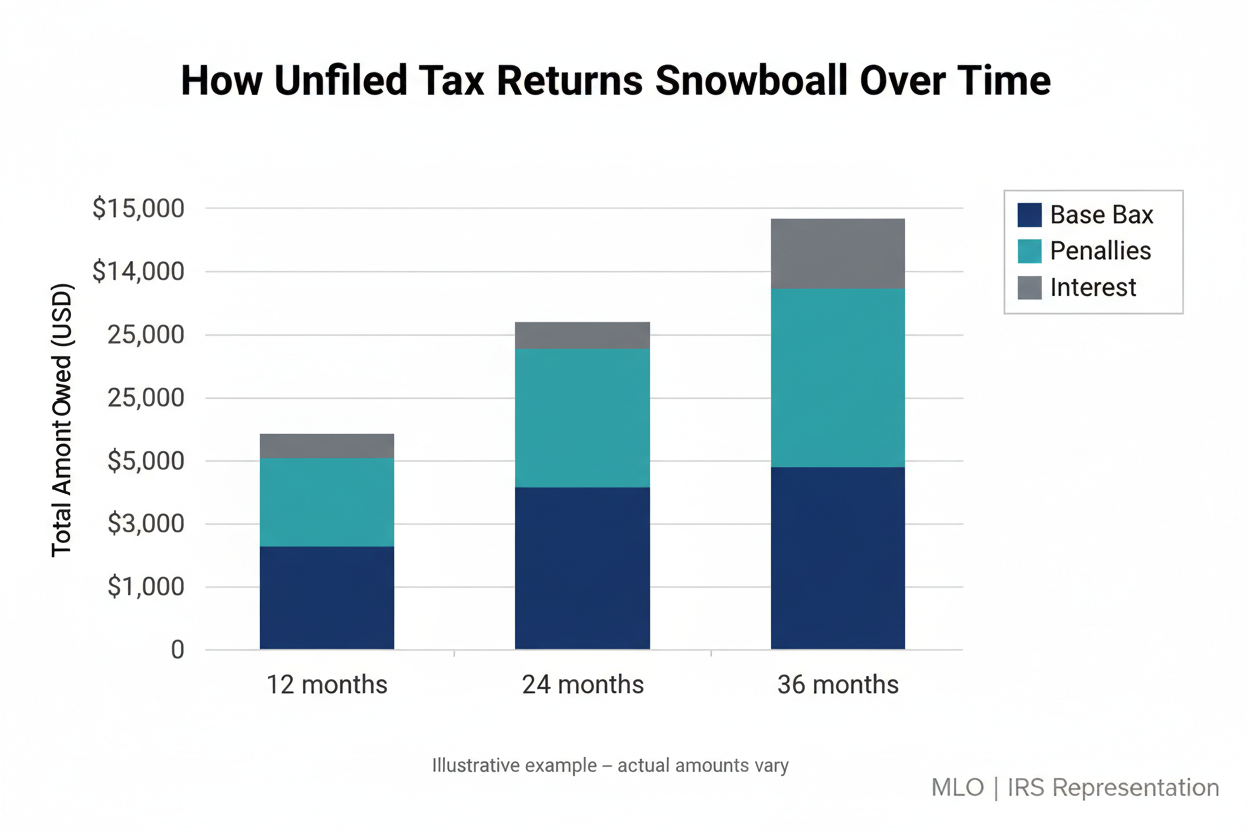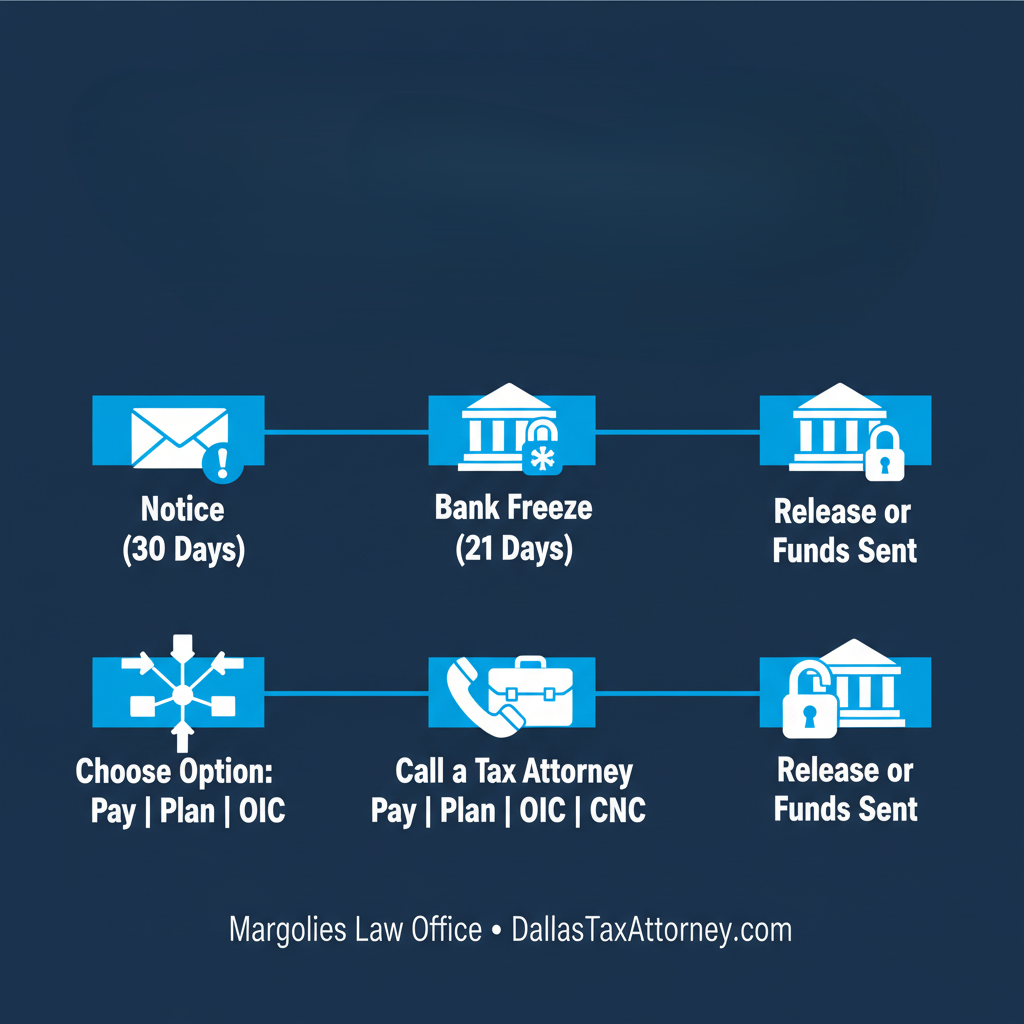Handling Unfiled Tax Returns: A Complete Guide

If you have an unfiled tax return, it’s crucial to address it as soon as possible to avoid severe consequences. According to the IRS, millions of taxpayers fail to file their required tax returns each year. This noncompliance not only jeopardizes financial stability but also invites penalties, interest, and even legal complications. However, resolving unfiled returns is not as daunting as it may seem. With the right approach, you can regain control of your financial situation and ensure future compliance. This guide provides a detailed step-by-step approach to addressing unfiled tax returns effectively.
Key Takeaways
- Act quickly on unfiled tax returns to avoid penalties, interest, and legal issues.
- Review records and request IRS transcripts to identify any unfiled returns.
- Gather necessary documentation like income records and expense receipts for accurate filings.
- Consult a tax professional for guidance and penalty negotiations.
- File accurately, prioritize older returns, and match IRS data.
- Explore penalty reduction options such as abatement and installment agreements.
- Stay compliant by meeting deadlines and using IRS resources.
Understanding Unfiled Tax Returns
Unfiled tax returns can be a source of stress and confusion for many taxpayers. Understanding what they are and the reasons behind not filing can help you take the necessary steps to resolve the issue. This section talks about the definition of unfiled tax returns and explores the common reasons why individuals may find themselves in this situation.
What Are Unfiled Tax Returns?
Unfiled tax returns refer to tax documents that have not been submitted to the IRS by the designated deadlines. Common reasons for not filing include:
- Procrastination or fear of owing money
- Lack of awareness about tax requirements
- Personal or financial hardships
Regardless of the reason, it’s essential to address unfiled returns promptly to mitigate penalties and interest.
Consequences of Unfiled Tax Returns and Unpaid Taxes
Failing to file your tax returns can lead to significant repercussions:
- Financial Penalties: The IRS imposes a failure-to-file penalty of 5% of unpaid taxes per month, up to 25%. Additionally, you may need to pay penalties for failure to file on time, which can further increase your financial burden.
- Accruing Interest: Interest on unpaid taxes compounds daily, increasing the amount owed.
- Legal Risks: Persistent noncompliance can result in criminal charges and imprisonment.
- Credit Damage: Tax liens can adversely impact your credit score, limiting financial opportunities.
- Loss of Refunds: Refunds are only available for returns filed within three years of their due date.
Assessing Your Situation
How to Determine If You Have Unfiled Tax Returns
The first step to resolving unfiled tax returns is identifying any missing years. You can:
- Review Personal Records: Check your filing history for gaps.
- Contact the IRS: Request a transcript of your account to verify unfiled returns.
Gathering Necessary Documentation and Wage and Income Transcripts
Accurate and complete records are essential for filing unfiled returns. Gather:
- Income Records: W-2s, 1099s, and other proof of earnings.
- Expense Documentation: Receipts for deductible expenses, medical bills, business costs, and 1098 forms reporting mortgage interest paid.
- IRS Transcripts: Wage and Income Transcripts from the IRS provide third-party reported data.
Filing Your Unfiled Tax Returns
Step 1: Organize Your Financial Records
Effective organization streamlines the filing process. Here’s how:
- Create folders for each tax year.
- Use digital tools to scan and store documents securely.
- Cross-check records against IRS transcripts to ensure accuracy.
Step 2: Consult a Tax Professional
Engaging a tax expert can simplify complex situations. Consider the following:
- Benefits of Professional Guidance: Tax professionals can identify deductions, address IRS notices, and negotiate penalties.
- Choosing the Right Advisor: Look for certified professionals like CPAs or enrolled agents with experience in delinquent tax issues.
Step 3: File Your Tax Returns
Filing unfiled returns involves these steps:
- Prioritize Older Returns: Address the oldest tax years first.
- Ensure Accuracy: Match your returns with IRS data to avoid discrepancies.
- Submit to the Correct IRS Unit: Depending on your circumstances, file returns to the appropriate IRS address or unit specified in IRS notices.
Having all filed tax returns and relevant documents is crucial when consulting with a tax professional. This helps identify any overlooked income or expenses and ensures a coherent tax history.
Requesting an Extension to File Tax Returns
If you cannot file your tax return by the original due date, you can request an extension to file your federal income tax return. This will give you an additional six months to file your return, but it’s essential to note that an extension to file is not an extension to pay. You’ll still need to estimate your tax bill and pay any taxes owed by the original due date to avoid penalties and interest.
To request an extension, you can file Form 4868, available on the Internal Revenue Service (IRS) website. You can also use tax preparation software or consult a tax professional to help you. Once you’ve filed for an extension, you’ll receive a confirmation from the IRS, and you’ll have until the new due date to file your tax return.
It’s crucial to remember that an extension to file is not a guarantee, and the IRS may deny your request if you don’t meet the requirements. Additionally, if you cannot pay your tax bill, you may be eligible for a payment plan or other options to help you manage your tax debt.
Dealing with IRS Penalties and Negotiations
Understanding Penalties and Interest
Unfiled returns often come with the following penalties:
- Failure-to-File Penalty: 5% per month on unpaid taxes, up to 25%.
- Failure-to-Pay Penalty: 0.5% monthly on unpaid tax, increasing your debt over time.
Limiting the Damage: Addressing Unpaid Taxes
If you have unpaid taxes, addressing the issue as soon as possible is essential to limit the damage. The longer you wait, the more penalties and interest you’ll accrue, which can significantly increase your tax bill.
You can start by contacting the IRS to discuss your options to limit the damage. You may be eligible for a payment plan, which can help you pay off your tax debt in installments. You can also consider requesting a temporary waiver of penalties and interest, which can help reduce your debt.
It’s also essential to file any unfiled tax returns as soon as possible. This will help you avoid additional penalties and interest, and you may be eligible for tax credits and deductions that can reduce your tax bill.
Options for Reducing Penalties
You can mitigate penalties through these programs:
- Penalty Abatement: Request relief if you have reasonable cause, such as illness or natural disasters.
- First-Time Penalty Abatement: Qualify for leniency if you have a clean compliance history for the previous three years.
Making estimated tax payments is crucial to stay compliant with tax obligations and avoid potential penalties.
Negotiating with the IRS
If you owe more than you can pay, explore these options:
- Installment Agreements: Set up monthly payments to manage debt.
Offer in Compromise: Negotiate to settle your tax debt for less than the full amount owed.
Resolving Unfiled Tax Returns
Resolving unfiled tax returns can be a complex and time-consuming process, but it’s essential to address the issue to avoid penalties and interest. Here are some steps you can take to resolve unfiled tax returns:
- Gather all necessary documents, including W-2s, 1099s, and other supporting documentation.
- Review tax laws for each year to ensure you’re taking advantage of all eligible tax credits and deductions.
- Create a timeline to help you stay organized and meet all necessary deadlines.
- Seek professional help, such as a tax attorney or enrolled agent.
How to Resolve Unfiled Tax Returns
Resolving unfiled tax returns requires careful attention to detail and a thorough understanding of tax laws and regulations. Here are some additional tips to help you resolve unfiled tax returns:
- Use tax preparation software or consult a tax professional to help you prepare and file your tax returns.
- Ensure you’re using the correct tax forms and schedules for each year.
- Take advantage of all eligible tax credits and deductions to reduce your tax bill.
- Keep accurate records of all correspondence with the IRS, including dates, times, and details of conversations.
Following these steps and tips, you can resolve unfiled tax returns and get back on track with your tax responsibilities. Stay organized, seek professional help if needed, and take advantage of all eligible tax credits and deductions to reduce your tax bill.
Preventing Future Issues
Staying Compliant with Tax Laws
Avoid future problems by adhering to these practices:
- Meet Deadlines: Mark tax due dates on your calendar. Filing income tax returns on time is crucial to avoid penalties.
- Use IRS Resources: Access online tools and updates to stay informed.
Leveraging Technology
Modern technology can make tax compliance more manageable:
- Use tax preparation software for accurate filings.
- Set up electronic filing and direct deposit for faster processing and refunds.
Conclusion
Unfiled tax returns don’t have to lead to financial ruin. By understanding the consequences, organizing your records, and seeking professional help, you can address the issue and regain control of your financial future. Don’t delay. Take the first step today by contacting the IRS or consulting a tax professional to explore your options. Staying proactive ensures long-term compliance and peace of mind.
Margolies Law Office Can Help
Margolies Law Office in Dallas, TX, offers expert legal representation before the IRS, United States Tax Court, and Federal Courts, giving us an edge over CPA firms for complex cases. Whether you're receiving your first IRS notice or facing wage garnishments or property seizures, our seasoned Dallas IRS Attorneys can step in at any stage.
Don't face the IRS alone; leverage your right to professional representation. We focus on achieving tailored solutions and easing stress by handling the complexities of IRS procedures and tax laws. Our services include asset protection, payment plans, and debt settlements.
Let Andrew Margolies and our team resolve your IRS issues. Contact us today for a personalized strategy to regain your peace of mind in Dallas, TX.
FAQs
What happens if I never file my taxes?
The IRS may impose severe penalties, accrue interest, and, in extreme cases, initiate legal action.
Can the IRS garnish my wages for unfiled taxes?
Yes, the IRS can garnish wages, levy bank accounts, or place liens on property.
How far back can I file unfiled tax returns?
The IRS generally requires taxpayers to file returns for the past six years. Filing is important to claim any potential tax refund.
Is there a statute of limitations for unfiled returns?
No statute exists for unfiled returns; the IRS can pursue them indefinitely. However, taxpayers can only claim tax refunds for three years after the original due date of the tax return.
Can I go to jail for not filing taxes?
While rare, failure to file taxes can result in criminal charges and imprisonment.

.webp)


